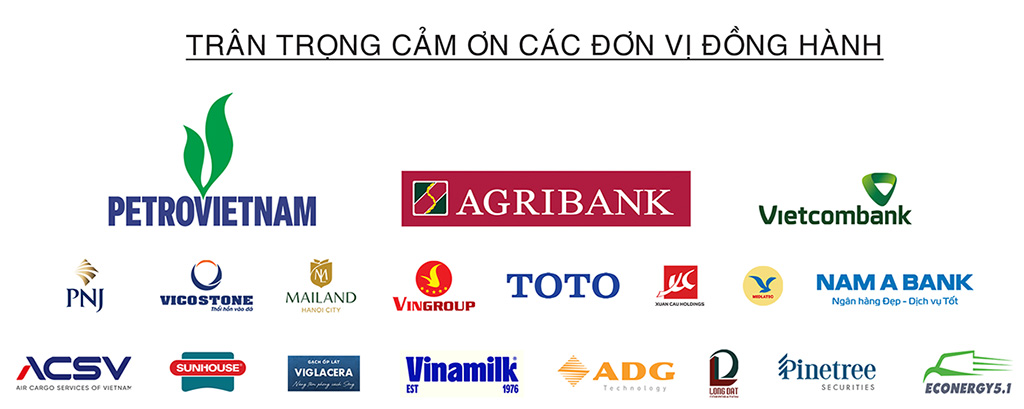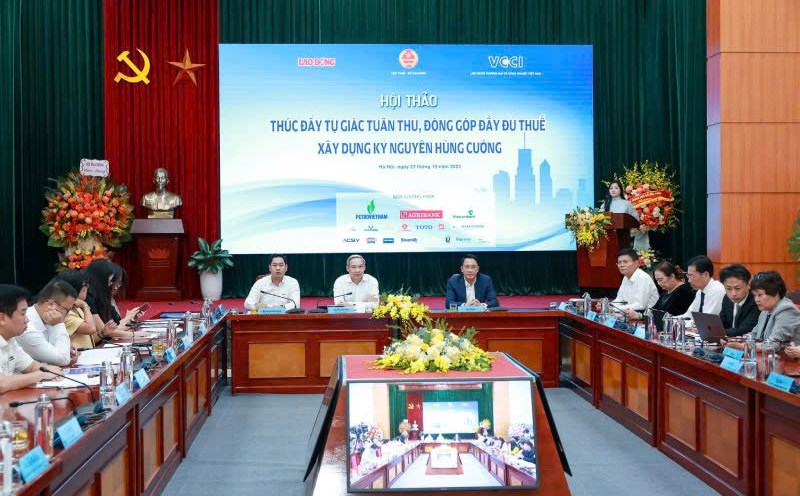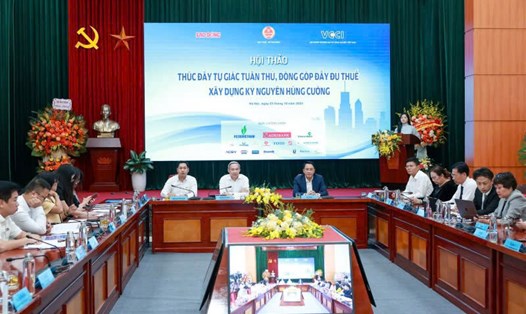In recent years, Hanoi Tax has always been a leading unit in state budget collection, budget revenue always exceeds the assigned estimate, revenue in the following year is always higher than the previous year, which has contributed positively to the total revenue of the whole country. Specifically: in the period of 2021-2024, Hanoi Tax City has collected nearly 1 million 500 trillion VND, the average growth rate over the years reached nearly 15.7%; In particular, in the first 9 months of 2025, Hanoi Tax City has collected over 508 trillion VND, reaching 106% of the estimate, an increase of 42.1% over the same period, accounting for about 25% of the national budget revenue.
Achieving the above results, Hanoi Tax has constantly innovated, transforming from the model of "tax management according to functions, combined with subjects" to "management according to subjects, combined with management according to functions" to fundamentally shift from "management" to "service"; changing management thinking, approaching taxpayers as a partner, always listening, supporting, and promptly resolving all problems of taxpayers.
In addition, Hanoi Tax City is also the unit chosen by the Tax sector to pilot many new programs related to administrative procedure reform, modernization of tax management, as well as digital transformation, strong application of information technology in all stages and steps of management, reduction of compliance costs, transparency of implementation procedures, creating a fair and equal business environment between businesses and between economic sectors.
Specifically, with a large number of subjects managing, to improve the effectiveness of tax management, tax authorities have cooperated with commercial banks, credit institutions and solutions providers to build information technology application platforms: Chatbot AI, data digitalization, deployment of electronic invoices, integration of public services on the National Public Service Portal..., supporting the business community and taxpayers to easily grasp preferential policies, tax exemptions of the Party and State, promptly resolve tax problems, look up tax obligations, declare taxes and pay taxes electronically anytime, anywhere 24/7, quickly and conveniently through electronic devices with internet connection: computers, smartphones, tablets...
Up to now, the habit of taxpayers in using electronic invoices, declaring electronic taxes, paying electronic taxes has been basically formed and has achieved some outstanding results: over 99% of enterprises have declared and paid taxes electronically through the Tax Authority's Electronic Information Portal connected to commercial banks and credit institutions; over 160,000 enterprises and over 10,000 business households have registered to use electronic invoices of tax authorities; over 21,000 enterprises and business households have submitted applications to deploy electronic invoices generated from cash registers; over 62% of individual business households have installed the Etax Mobile application on mobile devices, over 60% of land records are done through the National Public Service Portal;...
In tax management, with the goal of minimizing social costs, encouraging self-compliance, and protecting charitable enterprises, the Tax Authority implements tax management according to risk management methods, with focus and key points, applying information technology to cross-analyze and cross- compare big data sources (big data), evaluate and classify taxpayers, thereby focusing resources on handling high-risk subjects to improve tax management efficiency, limit fraud, tax evasion, and state budget loss.
To promote this method effectively, the Tax Authority is determined to operate according to three core principles: transparency of criteria - consistency in application - priority of pre-sanction support, and has brought high efficiency, creating a breakthrough in the work of handling tax refund records, tax debt management, and applying effective tax debt enforcement methods in the recent past. Specifically:
Tax authorities apply information technology, apply risk management to assess and resolve tax refund records quickly and effectively.
Taxation is one of the important stages of tax management, aiming to ensure the legitimate rights of taxpayers, while contributing to creating a transparent and open investment and business environment.
However, this is also an area with many potential risks of tax fraud, many taxpayers use illegal invoices, create fake records of buying and selling goods, and manipulate documents from input and output to return taxes in violation of regulations, causing loss of state budget revenue.
To strengthen control and improve the quality of tax refund handling, the tax authority has synchronously deployed many solutions, focusing on the application of information technology, analysis of records, risk management in the tax refund handling process:
- For personal income tax refunds: Tax authorities deploy automatic personal income tax refund applications, accordingly, the application system of the tax authority will automatically assess the risk of individuals' tax refund records based on information managed by the tax authority on the individual's compliance history, income declaration data, tax deduction documents, cross-comparison with payment unit information... to implement tax refunds for individuals with income from salaries and wages. With an automatic personal income tax refund solution, an automatic system for data synthesis and testing, it helps tax refunds be quick, accurate, transparent, limiting errors due to ignoring manual data entry steps of tax officers. After 6 months of implementation, nearly 55,000 records have been automatically refunded personal income tax, accounting for 22% of the number of records refunded in the first 9 months of the year.
- For VAT refunds: Tax authorities apply information technology in looking up, analyzing data, controlling the origin of goods supply chains of enterprises; Connecting data between tax authorities and with relevant agencies such as Customs, Treasury, Banks, National Database to conduct cross-checking, comparing declared information, promptly detecting signs of fraud; Applying a system of analysis and risk assessment of tax refund records on criteria ( history of tax compliance of taxpayers, type of enterprises, goods, business sector, number of refund requests, unusual signs of declaration, accounting...), developing a set of criteria to classify records into 3 groups: low risk, medium risk and high risk.
Depending on the risk level, the dossier can choose the appropriate refund method: Pre-ordering or pre-refund inspection; The tax authority prioritizes classifying taxpayers into the group of subjects subject to pre-tax refund for taxpayers with a history of good compliance (resolving the refund dossier within 6 working days from the date of receiving the complete refund dossier from the taxpayer) to shorten the tax refund time, create cash flow, and support the production and business activities of taxpayers.
At the same time, the Tax Authority also strengthens post-recharge inspection measures, especially for enterprises with unusual signs of buying and selling invoices, transactions through many intermediaries, and unusual signs in export and export records of fake goods to profit from tax refunds from the state budget.
As a result, in the first 9 months of 2025, the tax authority has resolved tax refunds on time for 746 eligible records, with the refund amount being over VND 5,500 billion.
Classify tax debts to implement appropriate, fair and effective measures to manage, urge and enforce tax debts.
Tax arrears management is an important step in tax management. If the tax debt situation is not closely monitored, strictly managed and timely urging measures are taken, it will create inequality in business among taxpayers, directly affecting state budget revenue, leaving negative consequences, reducing legal effectiveness and reducing the quality of tax management.
In reality, there are still many businesses with large tax debts, which have lasted for many years, focusing on a number of groups of reasons:
(1) A part of enterprises previously were aware of complying with tax laws well, but due to the impact of the economic recession, they fell into a state of financial difficulties;
(2) Many ineffective and disadvantaged businesses have suffered long losses and have fallen into a state of dissolvement and bankruptcy but have not yet carried out the procedures for dissolving and bankruptcy according to regulations, leading to the inability to pay tax debts;
(3) A part of taxpayers with poor tax compliance, large tax debts but deliberately appropriating tax money for other purposes or a part of subjects who deliberately do not pay taxes on time, when the tax authority conducts verification and collects information to implement enforcement measures, these enterprises only pay arising tax debts that have passed the payment deadline of 91 days or more so as not to be enforced according to regulations.
To prevent tax debts from increasing, tax authorities have reviewed, classified debts, accurately compiled tax debts, analyzed the causes of debts of each tax debtor to find effective solutions to urge debt collection such as: encouraging and persuading businesses to have a plan to divide money sources to ensure both maintaining and developing production and business and having tax payment money;
At the same time, the Tax Authority also groups tax debtors, focuses on urging the group of subjects with large tax debts, deliberately sluggish to appropriate tax money, and violate tax laws (trading in invoices, doing illegal business, dispersing assets, fleeing etc.) to coordinate with competent authorities (Recharge agencies, local authorities, police, customs, banks...) to effectively implement enforcement measures: Withdrawing money from accounts; Devesrating part of salary or income; Coordinate with the Customs authority to enforce by stopping customs procedures for export and import goods; Stop carrying out exit procedures for business owners with large tax debts...; Or use severe enforcement measures such as: Avoiding the use of receipts; Arresting auctions; Collecting and selling assets; Collecting and receiving documents from other businesses that have been subject to enforcement...
As a result, by the end of September 2025, Hanoi Tax has enforced enforcement against more than 21,650 taxpayers with debts of over 90 days with the amount of enforced debts being 14,909 billion VND; The rate of tax payment and gradual payment of taxes by enforcement subjects in the whole area reached nearly 85%;
In addition to the results achieved in the process of modernizing the tax sector, it is impossible not to mention the role of press agencies - the pioneering force, connecting, accompanying, supervising and criticizing the tax agency is extremely important.
Through the series of articles reflecting, analyzing and recommending, press agencies have contributed to raising social awareness of tax policies, detecting loopholes in the mechanism, contributing to building trust between taxpayers and tax authorities.












